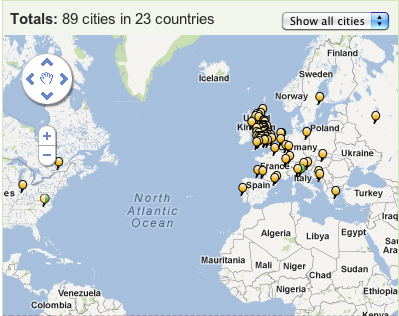The ‘Cities Visited’ Facebook Application
Posted by Brian Kelly on 22 Jun 2007
Over the past year or so I have been geo-located the talks I’ve given. This involves using Google Maps top find the latitude and longitude of the venue and adding this to an RSS feed for my talks. This gives me the ability to display maps of my forthcoming events and talks I gave in 2006 and 2005.
However effort is required to do this, especially locating the talks I gave prior to 2005. So although I would find it useful to be able to have a map showing when I’ve spoken since I started at UKOLN, I decided it would take too long to process the required data.
 But then I noticed the Cities I’ve Visited application in Facebook. And I realised that I could simply type in the names of the places I’ve been to in order to add them to a map (and as it uses an AJAX interface I didn’t even need to type in the full name). And I didn’t need to repeat the process for every time I’m been to an event at London. So I could very quickly create a map of the 64 towns and cities I’ve spoken at.
But then I noticed the Cities I’ve Visited application in Facebook. And I realised that I could simply type in the names of the places I’ve been to in order to add them to a map (and as it uses an AJAX interface I didn’t even need to type in the full name). And I didn’t need to repeat the process for every time I’m been to an event at London. So I could very quickly create a map of the 64 towns and cities I’ve spoken at.
When I used the application I became aware of some of its limitation: its coverage of towns and cities is not universal (so I couldn’t include details of my talk at Gregynog in mid-Wales) but perhaps more importantly (without wishing to offend the Welsh!) is the inability to export the data.
Andy Powell, in a post on Be aggregated as you would aggregate unto others published raised this issue recently on the eFoundations blog. But as I suggested on the eFoundations blog, this can be regarded as an example of “embracing constraints“. And rather than having to wait for the application to be fully-featured but it is released, releasing the software early and gaining feedback might actually be a more effective approach to development.
After all, as Andy himself pointed out, Slideshare originally didn’t allow uploaded slides to be downloaded, but this limitation was removed shortly afterwards.
And as a user of this application, I have decided that even if data export functionality is not added to the software, my risk assessment of the application leads me to be prepared to accept this limitation, in order to benefit from the service it provides at little effort to myself.
To summarise my views:
- Software development is a process
- The process may include releasing early and releasing often in order to engage users in the process
- Users may be prepared to embrace the constraints of an application, provided they are aware of such constraints and the implications.
- There can be a missed opportunity cost associated with not using a service because it doesn’t do everything.
- Similar issues related to embracing constraints and the dangers of missed opportunities apply even more so to developers, as getting the perfect software out after the user community has embraced flawed applications may result in having to write off the investment in development costs of that perfect, but little used application.
Note: The image in this post was missing. A new image was added on 1 January 2012.




Paul Walk said
I’m not sure I agree with:
“Users may be prepared to embrace the constraints of an application, provided they are aware of such constraints and the implications.”
Isn’t this just an example of “Users may be prepared to *put up* with the constraints….”
Doesn’t “embracing constraints” suggest something more proactive on the part of the user? Otherwise, in this example, wouldn’t the implication be that if the missing data export functionality was subsequently added, my experience of this software would be somehow diminished….
Brian Kelly (UK Web Focus) said
Hi Paul
The term “embracing constraints” seems to have been coined to describe an approach which can be taken by a developer. I am suggesting that the user needs to be a part of the process. Perhaps a better way of describing this would be to develop the grammatical structure i.e. I, as a user, am an embracee of the contraints you, the developer, have embraced. However this is a fairly ugly sentence, so I suspect it won’t ctach on.
Review of this Blog’s Usage in 2010 « UK Web Focus said
[…] The ‘Cities Visited’ Facebook Application June 2007 2 comments […]
100,000 Views « UK Web Focus said
[…] UK Universities On Facebook. This has been the third most popular post, following the post on The ‘Cities Visited’ Facebook Application and, in second place, one on TokBox – A Useful Video-Conferencing Tool Or […]
Mike said
7 years later and still no export functionality …. Ive had second thoughts about this app (as well as Facebook itself) due to the data it collects:
Your basic info
Your profile info: description, activities, birthday, education history, groups, hometown, interests, likes, location, relationship status, relationship details, religious and political views, website and work history
Your stories: events, notes, photos, status updates and videos
Friends’ profile info: descriptions, Activities, birthdays, education histories, groups, hometowns, interests, likes, locations, relationship statuses, relationship details, religious and political views, websites and work histories
Stories shared with you: events, notes, photos, status updates and videos